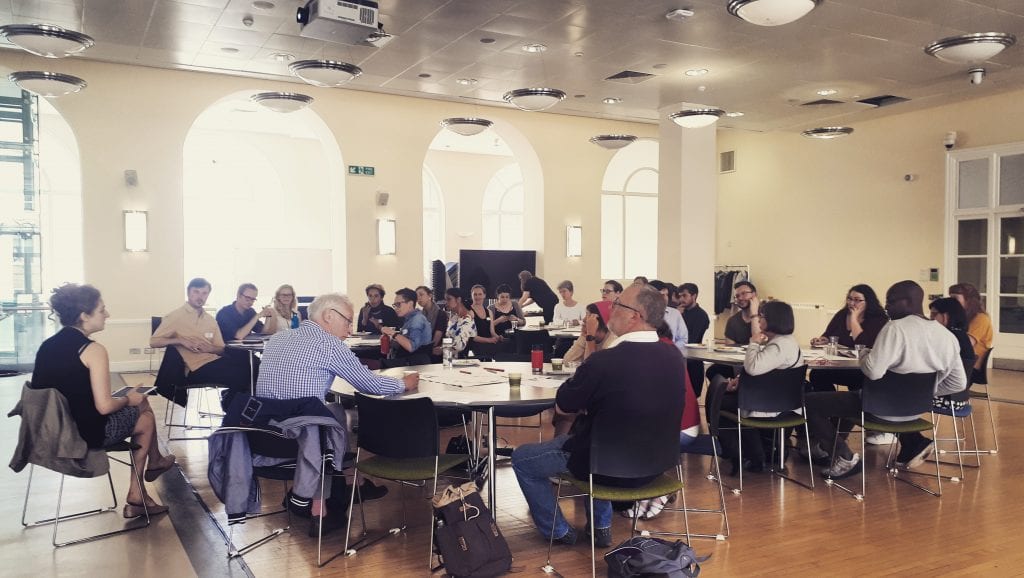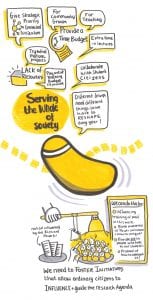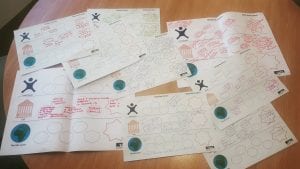Public engagement at UCL: Stepping stones to the future
By ucwetca, on 6 July 2018
At the 10th Anniversary Provost’s Awards for Public Engagement, the Provost launched a formal call to the UCL community to join a conversation about where we want to take public engagement at UCL by 2028. He has invited Laura Cream, Head of Public Engagement, to meet him in Spring 2019 to share the Top Ten Targets for Public Engagement at UCL, and the stepping stones for reaching them. So on Wednesday 20 June 2018, our network meeting brought together a variety of UCL staff and students to begin the conversation and open the platform to others at UCL to lead it.

The session was opened by Laura Cream who highlighted that while UCL should be rightly proud of its leading role in the sector, there is still a lot more to do. She underlined that this can only happen with a strong coalition of allies inside and outside the institution. Laura’s challenge to the group, and to her team, is to turn the aspirational rhetoric of institutional strategies and plans into tangible change at UCL and concrete actions which build enduring links to communities in our neighbourhoods. She particularly wanted to encourage us to think about creating clearly signposted ‘doorways into UCL’ for communities outside, cross-institutional platforms which help people shortcut the process of relationship building and delivering on commitments to improving the lives of those who live and work in our neighbourhoods in terms of access to our procurement contracts, employment opportunities and facilities. Finally, she called for a greater focus on public engagement within the curriculum. Laura sets out further her vision for Public Engagement in the next 10 years.
The meeting was then run by leaders in engagement from across the institution.

First up was Professor Sarah Bell, of the Bartlett School of Environment, Energy & Resources, and director of the Engineering Exchange. Sarah pulled no punches and, via an analysis of the relative staffing and governance levels of Public Engagement and Innovation and Enterprise at UCL, argued that universities have become unbalanced in terms of the interests that they serve. Sarah argued that while these two areas have much in common – their focus on the importance of upstream engagement, a special interest in London and the value of co-production and co-design) – what sets them apart is their access to both power and money. Sarah argued that UCL Public Engagement has consistently punched above its weight given its scale and resource-level (citing the inclusion of public engagement in both the draft UCL Research Strategy and UCL Academic Careers Promotion framework as two examples) but asked how much more they could achieve if similarities between these areas could be exploited to further create opportunities to work with public groups in meaningful ways.

Next up, Andi Skilton (Senior Research Associate Lead at NIHR Biomedical Research Centre at Moorfields Eye Hospital NHS Foundation Trust and UCL Institute of Ophthalmology) stimulated discussion around Patient and Public Involvement work at UCL. Andi outlined the PPI agenda as set out by the National Institute for Health Research and INVOLVE, again pointing out that there were many crossovers between this and the broader public engagement agenda which and could be further exploited in the next ten years. The section closed with a discussion between those working in PPI and those working public engagement, creating an opportunity to share expertise and offer solutions to problems that may not occur to you when you’re working within a single, rigid policy area.

Dr Michael Edwards of the Bartlett, and founder member of the International Network for Urban Research and Action (INURA) and of the Planners Network UK (PNUK), gave us insight into his celebrated public engagement achievements. He highlighted his delight to see that public engagement was no longer seen as a barrier to promotion, and in fact can now enhance those prospects. Michael spoke passionately about working with students to engender a sense of engagement as a necessary part of both learning and researching, and that UCL’s work should be guided by the needs of the whole of society, rather than select elements of it. Michael convened a group discussion on how public engagement could work better with the Connected Curriculum, and how we could be more responsive to community need.

Finally, John Braime, Manager of the Volunteering Service, took us through the evolution he had observed over the past 10 years and then focused on many of the barriers left to be navigated to achieve our collective ambition of engaging community and public groups in a meaningful fashion. John gave us summaries of Creating Connections, the Evaluation Exchange and the Science Shop, a few examples of mechanisms that we have used to link groups together and to initiate projects beginning with local, community needs. John challenged the group to think about how we will create more opportunities for external partners to initiate and lead projects, supported by expertise at UCL.
The session ended with Georgia Pitts, Public Engagement Manager for BEAMS, and Lizzy Baddeley, Project Manager for EPSRC Community Engagement, leading a discussion on what our collective destinations for the next ten years might be, and the stepping stones to get there. I bounced around a few tables and eavesdropped on conversations which ranged from sign-posting opportunities for communities, creating Public Engagement champions across UCL departments, establishing more matchmaking mechanisms for projects and a host of other ideas.

Just a snapshot of some of the suggested ‘Destinations’ and ‘Stepping Stones’ for Public Engagement at UCL
The session was lively and has given us much food for thought, but we still want to hear your ideas. We’ll be updating you all soon on our next steps and further chances for discussion in September. In the meantime, share your ideas by emailing the UCL Public Engagement Unit at publicengagement@ucl.ac.uk or connect on Twitter by tagging @UCLEngage with the hashtag #PublicEngagementFutures
 Close
Close


